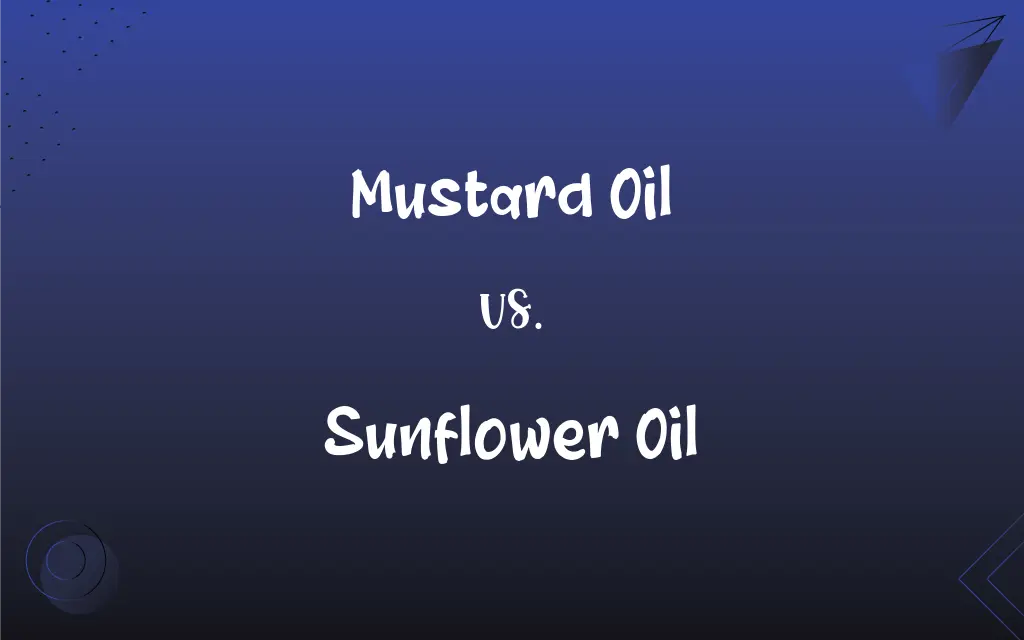Mustard Oil vs. Sunflower Oil: What's the Difference?
Edited by Aimie Carlson || By Janet White || Published on January 25, 2024
Mustard Oil is a pungent oil made from mustard seeds, used for cooking and medicinal purposes. Sunflower Oil is a mild-tasting vegetable oil derived from sunflower seeds, commonly used for frying and baking.

Key Differences
Mustard oil, extracted from the seeds of the mustard plant, is known for its strong aroma and pungent flavor. It is commonly used in South Asian cooking, particularly for frying and sautéing. Sunflower oil, on the other hand, is extracted from sunflower seeds and has a much milder taste and light color, making it a popular choice for baking and salad dressings in Western cuisine.
In terms of health benefits, mustard oil is high in monounsaturated and polyunsaturated fats and contains a compound called allyl isothiocyanate, which gives it its characteristic pungent taste and may have anti-inflammatory properties. Sunflower oil is rich in Vitamin E and low in saturated fat, which makes it a heart-healthy option for cooking.
Mustard oil has a higher smoke point than sunflower oil, which means it can be used for cooking at higher temperatures without breaking down and producing harmful substances. This makes it suitable for deep-frying and high-heat cooking. Sunflower oil, with a lower smoke point, is better suited for low to medium-heat cooking.
In traditional medicine, mustard oil is used for its therapeutic properties, including relief from cold and cough, and for massages to improve blood circulation. Sunflower oil is less known for medicinal uses but is favored in cosmetic applications due to its moisturizing properties.
Mustard oil is often used in pickling and preserving food in South Asian cuisines, while sunflower oil, due to its neutral flavor, is a preferred oil in the food industry for processed foods and snacks.
ADVERTISEMENT
Comparison Chart
Flavor
Strong and pungent
Mild and neutral
Health Benefits
Rich in monounsaturated fats, anti-inflammatory
High in Vitamin E, low in saturated fat
Smoke Point
Higher smoke point
Lower smoke point
Culinary Uses
Frying, pickling, South Asian cuisine
Baking, salad dressings, Western cuisine
Additional Uses
Medicinal and therapeutic applications
Cosmetic applications, processed foods
ADVERTISEMENT
Mustard Oil and Sunflower Oil Definitions
Mustard Oil
Mustard oil is used in both culinary and medicinal applications.
Mustard oil was applied topically for its soothing effect on the skin.
Sunflower Oil
Sunflower oil is commonly used for frying and salad dressings.
The salad was dressed with sunflower oil for a light taste.
Mustard Oil
Mustard oil is known for its strong aroma and health benefits.
The dish was flavored with mustard oil for an authentic taste.
Sunflower Oil
Sunflower oil is high in Vitamin E and low in saturated fats.
Sunflower oil is a healthier option for heart-conscious diets.
Mustard Oil
Mustard oil is a pungent, flavorful oil extracted from mustard seeds.
Mustard oil is traditionally used for frying in many Indian recipes.
Sunflower Oil
Sunflower oil is a light, neutral-flavored oil from sunflower seeds.
Sunflower oil was chosen for baking due to its mild flavor.
Mustard Oil
Mustard oil is a popular cooking oil in South Asian countries.
Mustard oil is a staple in Bengali cooking for its unique flavor.
Sunflower Oil
Sunflower oil is preferred for its light color and mild taste.
Sunflower oil's neutral taste makes it versatile for various recipes.
Mustard Oil
Mustard oil has a high smoke point, suitable for high-heat cooking.
Mustard oil was used for deep-frying due to its high smoke point.
Sunflower Oil
Sunflower oil is widely used in the food industry and cosmetics.
Sunflower oil is a common ingredient in processed snacks.
FAQs
Is sunflower oil suitable for high-heat cooking?
Sunflower oil is best for low to medium-heat cooking due to its lower smoke point.
What is the main use of mustard oil in cooking?
Mustard oil is mainly used for frying and flavoring in South Asian cuisine.
Is mustard oil good for health?
Yes, mustard oil is high in healthy fats and may have anti-inflammatory properties.
Is sunflower oil healthy?
Yes, sunflower oil is healthy, particularly due to its high Vitamin E content and low saturated fat.
What is sunflower oil?
Sunflower oil is a vegetable oil derived from sunflower seeds.
Can mustard oil be used for baking?
Mustard oil is not typically used for baking due to its strong flavor.
What are the cosmetic uses of sunflower oil?
Sunflower oil is used in cosmetics for its moisturizing properties.
Can mustard oil be used in salad dressings?
Mustard oil can be used in dressings, but its strong flavor may not suit all palates.
What is mustard oil?
Mustard oil is an oil extracted from the seeds of the mustard plant.
What is sunflower oil mainly used for?
Sunflower oil is used for frying, baking, and as a salad dressing.
Is sunflower oil popular worldwide?
Yes, sunflower oil is widely used in many countries due to its versatility.
Is sunflower oil used in processed foods?
Yes, sunflower oil is commonly used in processed foods due to its neutral taste.
Is mustard oil commonly used in Western cooking?
No, mustard oil is less common in Western cooking and more prevalent in South Asian cuisines.
Can sunflower oil be used in skincare products?
Yes, sunflower oil is often used in skincare products for its moisturizing properties.
What are the medicinal uses of mustard oil?
Mustard oil is used for relief from cold and cough and for therapeutic massages.
Does mustard oil have a strong flavor?
Yes, mustard oil is known for its strong and pungent flavor.
Is sunflower oil flavorless?
Sunflower oil has a very mild, almost neutral flavor.
What is the smoke point of mustard oil?
Mustard oil has a high smoke point, suitable for frying and high-heat cooking.
What is the smoke point of sunflower oil?
Sunflower oil has a lower smoke point, ideal for low to medium-heat cooking.
Can mustard oil be used for deep frying?
Yes, mustard oil is suitable for deep frying due to its high smoke point.
About Author
Written by
Janet WhiteJanet White has been an esteemed writer and blogger for Difference Wiki. Holding a Master's degree in Science and Medical Journalism from the prestigious Boston University, she has consistently demonstrated her expertise and passion for her field. When she's not immersed in her work, Janet relishes her time exercising, delving into a good book, and cherishing moments with friends and family.
Edited by
Aimie CarlsonAimie Carlson, holding a master's degree in English literature, is a fervent English language enthusiast. She lends her writing talents to Difference Wiki, a prominent website that specializes in comparisons, offering readers insightful analyses that both captivate and inform.

































































